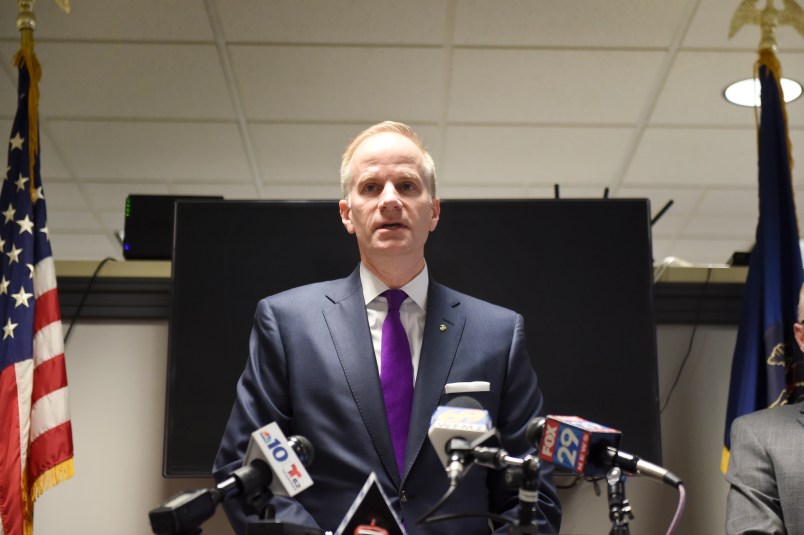When even former Attorney General Bill Bar is saying you’re playing politics with false claims about voter fraud, you’ve got issues.
But that’s just what happened Tuesday, when Barr called out William McSwain, the former Trump-appointed U.S. attorney for Philadelphia and now a potential Republican contender for governor in the state.
In an interview with the Washington Post, Barr said McSwain was trying to get on Trump’s good side with a months-after-the-fact claim about shenanigans at the Justice Department in the aftermath of the 2020 election — namely, the allegation that Barr told McSwain not to speak about “possible election irregularities,” and that McSwain was directed to pass serious allegations to Pennsylvania’s Democratic attorney general.
“Any suggestion that McSwain was told to stand down from investigating allegations of election fraud is false. It’s just false,” Barr told the Post. McSwain’s assertions, Barr added, “appeared to have been made to mollify President Trump to gain his support for McSwain’s planned run for governor.”
McSwain has mostly stayed quiet since Trump made public the groveling letter that McSwain wrote to him in June — long after McSwain’s January resignation as U.S. attorney. The former U.S. attorney said Tuesday, “I was pleased that [the former President] shared my letter — because I believe in transparency. The more people who know the facts, the better.”
‘I would be honored to have your support’
In a sense, the letter speaks for itself.
In the note to the former President, McSwain not only dished on political enemies like Philadelphia DA Larry Krasner (“radical leftist,” he wrote) but also seemingly attempted to flatter Trump by telling him exactly what he wanted to hear about the election.
The 2020 election was a “partisan disgrace,” McSwain wrote to Trump, and Barr was also part of the problem, he claimed: For one thing, the former U.S. attorney wrote that Barr had instructed him to not make public statements about “possible election regularities.”
“I was also given a directive to pass along serious allegations to the State Attorney General for investigation – the same State Attorney General who had already declared that you could not win,” he wrote, referring to Pennsylvania’s Democratic attorney general and likely gubernatorial candidate Josh Shapiro.
Why didn’t McSwain pipe up then, rather than months later? Well, he wrote, “as a Marine infantry officer, I was trained to follow the chain of command and to respect the orders of my superiors, even when I disagree with them.” Why speak out now? McSwain doesn’t really say, but… we can take a guess based on his next paragraph.
“I will be the Republican candidate for Governor with the best chance to win the general election in November 2022,” he wrote. “Based on my background and experience, I am uniquely positioned to defeat Mr. Shapiro (the likely Democratic candidate) and would welcome the chance to discuss this with you in person. I would be honored to have your support.”
Thus, Barr’s statement about McSwain trying to “mollify” Trump.
It gets worse for McSwain: Barr told the Post that, upon reading the letter, he called McSwain Monday to complain. According to Barr, the former prosecutor defended the letter as technically accurate but also said: “I can’t have Trump attacking me.” McSwain, in Barr’s words, told the former attorney general that “he was in a tough spot because he wanted to run and he needed Trump’s at least neutrality, if not support.” (McSwain, the Post noted, disputed this description of the discussion.)
Post reporter Matt Zapotosky tweeted that the dispute was partially “semantics.”
But, in the view of Justice officials, McSwain didn’t want to publicize proven or even seriously alleged fraud. He wanted to complain about PA’s election rules and other matters. And it isn’t in the Justice Department’s purview to do election administration.
— Matt Zapotosky (@mattzap) July 13, 2021
‘Can you believe it?’
Trump, of course, juiced the letter for all it was worth, telling the crowd at CPAC over the weekend that “I just a day ago received a statement from the U.S. attorney, highly respected, in Pennsylvania, that Bill Barr would not allow him to investigate voter fraud. Can you believe it?”
Well, can you believe it?
Barr, you may remember, moved heaven and earth to answer Trump’s lies about voter fraud during the 2020 election: He confidently (and wrongly) asserted that foreign countries could “easily” make counterfeit ballots, and also that mail-in ballots weren’t actually secret.
He even gave prosecutors the green light to “pursue substantial allegations of voting and vote tabulation irregularities prior to the certification of elections,” breaking with the DOJ norm. That change prompted the resignation of the director of the DOJ’s election crimes branch, who said Barr was “abrogating the forty-year-old Non-Interference Policy for ballot fraud investigations in the period prior to elections becoming certified and uncontested.” (Months later, Barr defended the decision, saying in an interview with ABC News’ Jonathan Karl that he needed something to point to when Trump inevitably asked him to look into allegations of fraud.)
It wasn’t until Dec. 1, of course, that Barr finally offered a hedged rebuttal of Trump’s lies: “To date, we have not seen fraud on a scale that could have affected a different outcome in the election,” he told the Associated Press.
It took months and a lie-fueled insurrection attempt for the former attorney general to shorten the description to just one word: “Bullshit.”



